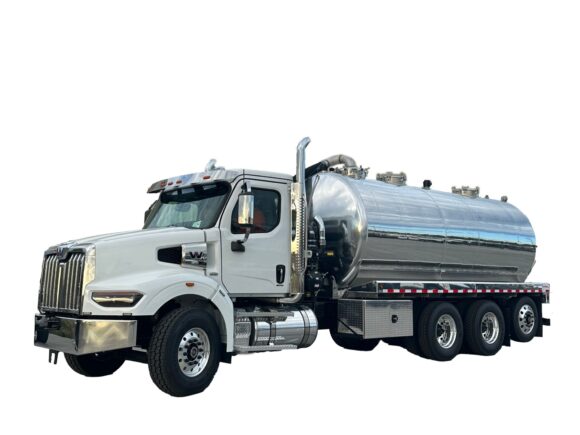The industrial world is experiencing a seismic shift toward cleaner, more efficient, and technologically advanced solutions. Among these innovations, hybrid vacuum trucks have emerged as a powerful tool at the intersection of environmental sustainability and operational excellence. With increasing pressure on industries to reduce emissions and operate more sustainably, hybrid vacuum trucks are not just an upgrade—they are the future.
What Are Hybrid Vacuum Trucks?
Hybrid vacuum trucks are advanced vehicles designed for material suction and transportation tasks, like cleaning sewers, catch basins, and industrial sites. They incorporate both diesel and electric power systems. This hybrid functionality allows the trucks to alternate between traditional combustion engines and battery-powered electric motors, depending on operational demands.
Unlike conventional vacuum trucks, which run entirely on fossil fuels, hybrid models can use electric power to perform many of their functions, especially idling and suction operations. This results in significant reductions in fuel consumption, noise, and environmental impact.
Efficiency in Action
One of the biggest selling points of hybrid vacuum trucks is their efficiency. Traditional vacuum trucks often run continuously, consuming large amounts of fuel even when idling during suction operations. Hybrid models solve this issue by enabling electric-powered vacuum systems that operate independently of the engine.
Reduced Fuel Consumption
By switching to electric power when appropriate, hybrid vacuum trucks can slash fuel usage by up to 40% or more. This translates into not just environmental benefits, but considerable cost savings. For companies managing large fleets, these savings add up quickly, significantly reducing operational expenses over time.
Lower Maintenance Costs
Internal combustion engines require frequent servicing due to wear and tear, especially when used for extended idling. Hybrid systems minimize engine use during these times, which reduces maintenance needs and extends vehicle life. Fewer oil changes, less wear on engine components, and reduced exhaust system repairs all contribute to a lower total cost of ownership.
Enhanced Uptime and Productivity
Hybrid vacuum trucks often come equipped with state-of-the-art monitoring systems that optimize performance and alert operators to maintenance needs before they become critical. This proactive approach keeps trucks on the road longer and reduces unplanned downtime.
Environmental Benefits: Cleaner Operations
As cities and industries move toward greener practices, hybrid vacuum trucks present an eco-friendly solution with real-world impact.
Reduced Emissions
Switching to electric power during idle and operational cycles dramatically cuts greenhouse gas emissions. In urban environments, where air quality is already a concern, reducing NOx, CO2, and particulate matter is a major advantage. Companies that invest in hybrid vacuum trucks are not only meeting stricter environmental regulations—they’re helping lead the charge toward cleaner air.
Quieter Performance
Traditional vacuum trucks are notoriously loud, creating noise pollution in neighborhoods and industrial areas alike. Hybrid vacuum trucks are significantly quieter when operating in electric mode. This is especially important for municipalities conducting early morning or late-night maintenance in residential areas. Lower noise levels improve community relations and reduce the need for noise mitigation procedures.
Sustainable Branding
Today’s customers and stakeholders care deeply about environmental responsibility. Using hybrid vacuum trucks signals to clients and the public that your company is committed to sustainable practices. It becomes a key differentiator in an increasingly eco-conscious marketplace.
Technological Innovation Driving Adoption
The rise of hybrid vacuum trucks is fueled by advances in automotive and clean-energy technology. Lithium-ion battery efficiency, regenerative braking systems, and intelligent energy management software have made hybrid power more reliable and practical than ever.
Integration with Telematics
Modern hybrid vacuum trucks are often equipped with telematics systems that provide real-time data on fuel usage, engine performance, route optimization, and more. This data empowers fleet managers to make informed decisions that improve efficiency and further reduce environmental impact.
Renewable Charging Options
Some hybrid trucks can be charged using renewable energy sources, such as solar or wind, further reducing their carbon footprint. When integrated into a green infrastructure plan, hybrid vacuum trucks represent a full-circle solution for sustainable industrial operations.
Regulatory Incentives and Future Legislation
Governments worldwide are tightening emissions regulations and offering incentives for adopting cleaner technology. From grants and tax credits to priority bidding on public contracts, businesses that adopt hybrid vacuum trucks reap numerous financial and strategic benefits.
Compliance with Local and Federal Guidelines
Hybrid vacuum trucks help businesses meet emissions standards compliance deadlines. With cities banning or limiting diesel vehicle access in certain zones, having a fleet of hybrid trucks ensures uninterrupted service and legal peace of mind.
Incentive Programs and Funding
Many local governments offer incentives to companies that invest in hybrid or electric commercial vehicles. These programs may cover a portion of the purchase cost, subsidize charging infrastructure, or provide ongoing tax breaks. Investing in hybrid vacuum trucks may offer significant upfront and long-term financial advantages.
Application Versatility
Hybrid vacuum trucks aren’t just for one niche—they’re incredibly versatile across multiple industries and applications:
- Municipalities: Sewer and storm drain cleaning, catch basin maintenance, hydro excavation.
- Industrial Facilities: Cleanup of hazardous or non-hazardous materials, tank cleaning, vacuum recovery.
- Construction: Digging and debris removal in sensitive environments, reducing site impact.
- Utilities: Safe, precise excavation near pipelines or buried cables with minimal disruption.
The ability to switch between electric and diesel power makes these trucks adaptable to various job sites, regulatory environments, and operational needs.
The Future Is Hybrid
The momentum behind hybrid vacuum trucks is undeniable. As technology evolves and more companies recognize the financial and environmental benefits, adoption rates will continue to climb.
OEM Commitment
Many leading original equipment manufacturers (OEMs) are now investing heavily in hybrid technology. They’re not just retrofitting old models—they’re designing hybrid vacuum trucks from the ground up. This means better integration, more robust performance, and even smarter control systems.
Electric-Only and Hydrogen Possibilities
Hybrid technology is often seen as a stepping stone to fully electric or even hydrogen-powered vacuum trucks. By adopting hybrid vehicles now, companies position themselves for a seamless transition to future technologies. Infrastructure for charging and maintenance will already be in place, smoothing the way for cleaner, even more advanced equipment.
Growing Market Demand
As sustainability becomes a cornerstone of business strategy, more clients are demanding greener solutions. Whether a municipality aims to reduce its carbon footprint or a corporation seeks ESG (Environmental, Social, and Governance) alignment, hybrid vacuum trucks perfectly match these goals.
A Smart Investment for a Cleaner Tomorrow
From improving operational efficiency and reducing fuel costs to enhancing environmental sustainability, hybrid vacuum trucks offer a compelling case for any company serious about the future. They represent more than a new kind of vehicle—they embody a shift in how industries approach responsibility, technology, and long-term planning.
Investing in hybrid vacuum trucks is not just an environmentally sound decision—it’s a strategic move that places your business ahead of the curve. As the world moves toward greener practices, those who embrace innovation today will be the leaders of tomorrow.



































